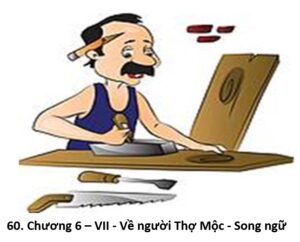60. Chương 6 – VII – Phẩm Nhện – Thí dụ về người Thợ Mộc – The simile of the Carpenter – Song ngữ
The Debate of King Milinda
King Milinda Vấn đạo (Milinda Panha)
English: T. W. Rhys Davids – From Pali Language.
Việt ngữ: Tỳ khưu Indacanda (Trương Đình Dũng).
Compile: Lotus group.

- Chương 6 – VII – Phẩm Nhện – Thí dụ về người Thợ Mộc – The simile of the Carpenter – Song ngữ
- ‘Venerable Nâgasena, those two qualities of the carpenter he ought to take, which are they?’
“Thưa ngài Nāgasena, điều mà ngài nói là: ‘Hai tính chất của người thợ mộc nên được hành trì,’ hai tính chất nên được hành trì ấy là các điều nào?”
‘Just, O king, as the carpenter saws off the wood along the line of the blackened string (he has put round it to guide him) 1; just so, O king, should the strenuous Bhikshu, earnest in effort, standing on righteousness as a basis, and holding in the hand of faith the saw of knowledge, cut off his evil dispositions according to the doctrine laid down by the Conquerors. This, O king, is the first quality of the carpenter he ought to have.
“Tâu đại vương, giống như người thợ mộc sau khi làm cho đúng đắn sợi chỉ đen rồi đẽo gọt khúc cây. Tâu đại vương, tương tợ y như thế vị hành giả thiết tha tu tập nên làm cho đúng đắn theo Giáo Pháp của đấng Chiến Thắng, nên đứng vững ở trái đất là giới, nên cầm lấy cái rìu trí tuệ bằng bàn tay đức tin, rồi nên đẽo gọt các phiền não. Tâu đại vương, điều này là tính chất thứ nhất của người thợ mộc nên được hành trì.
- ‘And again, O king, just as the carpenter, discarding the soft parts of the wood 2, takes the hard parts; just so, O king, should the strenuous Bhikshu, earnest in effort, forsaking the path of the discussion of useless theses, to wit:–the everlasting life theory–the let-us-eat-and-drink-for-tomorrow-we-die theory 3–the theory that the soul and the body are one and the same–that the soul is one thing, the body another–that all teachings are alike excellent 1–that what is not done is of no avail–that men’s actions are of no importance–that holiness of life does not matter–that on the destruction of beings nine new sorts of beings appear–that the constituent elements of being are eternal 2–that he who commits an act experiences the result thereof–that one acts and another experiences the result of this action–and other such theories of Karma or wrong views on the result of actions–forsaking, I say, all such theses, paths which lead to heresy, he should learn what is the real nature of those constituent elements of which each individuality is, for the short term of its individuality, put together, and so reach forward to that state which is void of lusts, of malice, and of dullness, in which the excitements of individuality are known no more, and which is therefore designated the Void Supreme 3.
This, O king, is the second quality of the carpenter he ought to have. For it was said, O king, by the Blessed One, the god over all gods, in the Sutta Nipâta:
“Get rid of filth 1! Put aside rubbish from you!
Winnow away the chaff 2, the men who hold
Those who are not so, as true Samanas!
Get rid of those who harbour evil thoughts,
Who follow after evil modes of life!
Thoughtful yourselves, and pure, with those resort,
With those associate, who are pure themselves 3!”‘
Tâu đại vương, còn có điều khác nữa, người thợ mộc loại bỏ giác cây và chọn lấy lõi cây. Tâu đại vương, tương tợ y như thế vị hành giả thiết tha tu tập nên loại bỏ các pháp có hình thức như là: thường (kiến), đoạn (kiến), mạng sống ấy thân thể ấy, mạng sống khác thân thể khác, cái ấy là tối thượng, cái khác là tối thượng, không làm không hình thành, không có sự tạo tác của con người, lối sống phi Phạm hạnh, sự hoại diệt của chúng sanh, sự tạo thành của chúng sanh mới, tính chất thường còn của các hành, người nào làm người ấy thọ hưởng, người khác làm người khác thọ hưởng, sự nhìn thấy quả của nghiệp, và tà kiến về quả của hành động; như vậy sau khi loại bỏ các pháp có hình thức như thế ấy và luôn cả các đường lối tranh cãi khác, nên chọn lấy bản thể của các pháp tạo tác, là không tánh tuyệt đối, là không tánh tối cao không lực tác động, không bị chê trách. Tâu đại vương, điều này là tính chất thứ nhì của người thợ mộc nên được hành trì. Tâu đại vương, điều này cũng đã được đức Thế Tôn, vị Trời vượt trội các vị Trời, nói đến ở Kinh Tập: [14]
‘Các ngươi hãy tống đi bụi bặm, và hãy lùa bỏ rác rưởi, sau đó hãy đuổi đi những kẻ nói nhiều, những kẻ phi Sa-môn, và những kẻ Sa-môn cao ngạo.
Sau khi tống đi các ước muốn ác xấu, các thói quen và hành xứ xấu xa, là những người trong sạch, trong khi sống chung với những người trong sạch, hãy tỏ ra có sự kính trọng lẫn nhau.’”
Sources:
Tài liệu tham khảo:
- http://budsas.net/uni/u-kinh-mitien/mitien-00.htm
- http://www.tamtangpaliviet.net/VHoc/45/Mil_11.htm
- http://www.sacred-texts.com/bud/sbe36/sbe3609.htm
- http://www.sacred-texts.com/bud/sbe36/sbe3615.htm
- http://globalbuddhismcommunity.com/vi-vn/Dictionary/AVThienPhuc/dtsr.aspx
